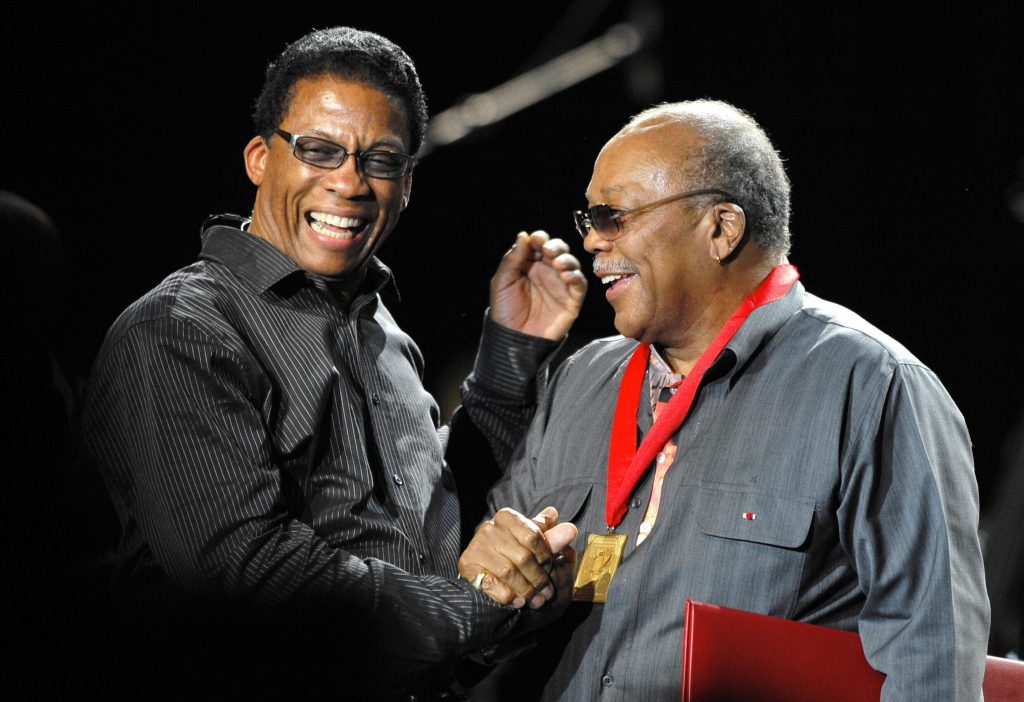Quincy Jones: From ‘street rat’ to music mastermind
4 min read
"You name it, Quincy's done it," said US jazz pianist and composer Herbie Hancock (L) of Quincy Jones (R) -- the pair are seen here in 2008 © FABRICE COFFRINI / AFP/File

"You name it, Quincy's done it," said US jazz pianist and composer Herbie Hancock (L) of Quincy Jones (R) -- the pair are seen here in 2008 © FABRICE COFFRINI / AFP/File
Quincy Jones, the legendary musician and producer, has left an indelible mark on the landscape of American music, transforming his life from humble beginnings into a storied career that has influenced generations. His journey, however, was not without its challenges. In 1974, at the age of 41, Jones suffered a brain aneurysm, prompting his famous friends to organize a tribute concert in anticipation of his passing. Yet, against the odds, he survived, and the planned tribute went on as a celebration of his life and achievements.
By that point, Jones had already made significant contributions to music as a performer, arranger, songwriter, producer, and record executive. He rose through the vibrant jazz scene of the 1950s, collaborating with artists such as Dinah Washington, Frank Sinatra, and Lesley Gore, and even reaching the top 10 as a recording artist himself.
The tribute concert featured some of the biggest names in entertainment, but Jones, accompanied by his neurologist who advised him to avoid excitement, attended. Reflecting on the experience, he noted how difficult it was to stay calm amidst the praises of icons like Richard Pryor, Marvin Gaye, and Sarah Vaughan.
The decades that followed were filled with groundbreaking achievements. Jones forged a legendary partnership with Michael Jackson, co-producing the iconic albums Off the Wall and Thriller. He also oversaw the creation of “We Are the World,” one of the best-selling singles in history. His influence reached far and wide, shaping various genres of American popular music and mentoring countless artists.
Jones’s beginnings were steeped in hardship. Growing up in the 1930s on Chicago’s South Side during the Great Depression, he faced numerous challenges. His mother was institutionalized when he was just seven, and his father worked as a carpenter for gangsters. Jones aspired to the gangster lifestyle but ultimately found solace in music. A pivotal moment occurred when he stumbled upon a piano in a community center during a night of hunger-driven mischief. “I touched it and every cell in my body said, this is what you’ll do for the rest of your life,” he recalled.
He began playing the trumpet and quickly made connections in the music scene, befriending Ray Charles and performing with icons like Billie Holiday and Dizzy Gillespie. His talent for arranging songs soon gained him recognition, and he became the first African American vice-president of a major record label when he joined Mercury Records in 1961. There, he produced the million-selling single “It’s My Party” by Lesley Gore and released the influential Big Band Bossa Nova compilation, featuring his own track “Soul Bossa Nova,” now a classic.
Jones’s collaboration with Frank Sinatra in the 1960s solidified his status in the industry, with Sinatra praising him as “one of the finest musicians I’ve ever known.” Their friendship extended beyond the studio, and Jones fondly recalled their wild nights together.
In addition to his work with Sinatra, Jones produced albums for legends like Aretha Franklin and Louis Armstrong, while also making a name for himself in film and television soundtracks, including In Cold Blood and The Italian Job. His music for The Wiz, starring Diana Ross and a young Michael Jackson, laid the groundwork for his future with the pop icon.
As he transitioned into the 1980s, Jones achieved unprecedented success with Jackson’s Thriller, a cultural phenomenon that combined R&B and pop with groundbreaking production. The album’s singles, including “Beat It,” showcased his talent for collaboration, famously enlisting Eddie Van Halen for a guitar solo that became legendary in its own right.
Jones continued to innovate, producing charity singles like “We Are the World” and working with stars such as George Benson and Donna Summer. His albums, including The Dude and Back on the Block, received critical acclaim and numerous awards, further solidifying his legacy.
Throughout his career, Jones remained dedicated to social activism, forming the Quincy Jones Listen Up Foundation and engaging in various charitable projects. His efforts to combat violence in the hip-hop community led him to host the Quincy Jones Hip-Hop Symposium in 1995.
Despite his immense success, Jones faced personal struggles, including multiple marriages and health issues. In 2015, he experienced a diabetic coma, and his health continued to decline, culminating in his passing at the age of 91.
The music world is mourning the loss of Quincy Jones, a trailblazer whose life and work reshaped the industry. Should another memorial concert be held, countless stars would undoubtedly line up to honor the extraordinary legacy of this musical mastermind.